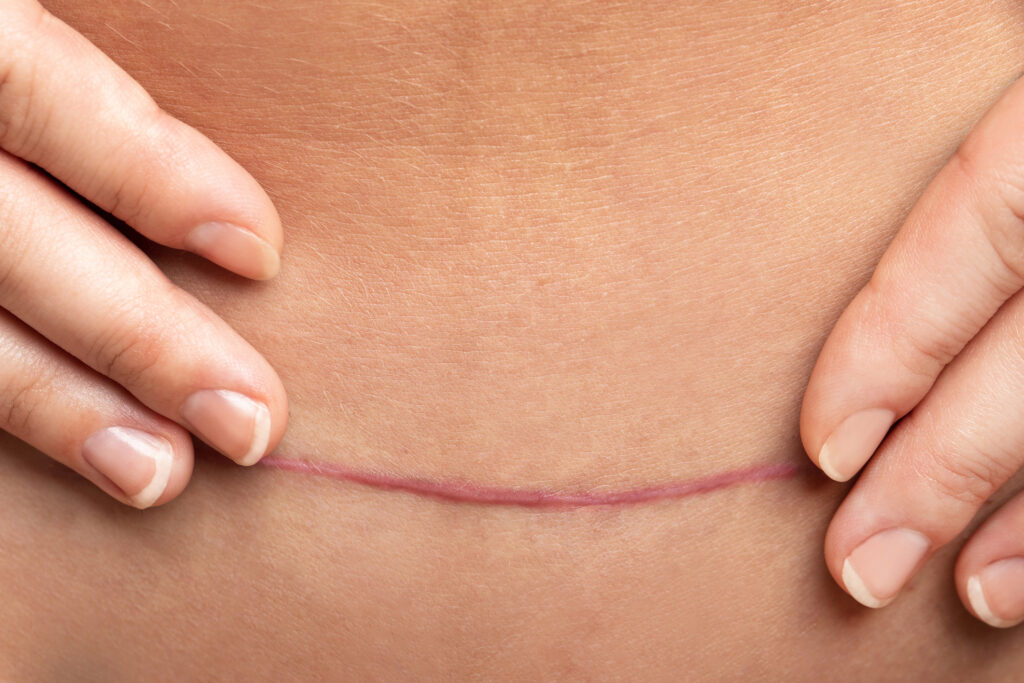C-Section Scar Healing: Tips and Treatments for Optimal Recovery
A caesarean section is a major surgery, and your body will need time to heal properly. The Devonshire Clinic helps our patients in London and throughout the UK ensure optimal recovery and C-section scar healing. Understanding the scar healing stages means knowing what to expect and how to care for yourself after giving birth. Read on for insights into each stage of healing and the best C-section recovery tips.
Understanding the C-Section Healing Process
C-section scars heal in stages. Each stage brings different changes to your body. The process takes time, and everyone heals at their own pace. Your scar will go through several phases. It starts as a fresh wound and slowly becomes a thin line. This process can take up to a year or more, so be patient with your body. It knows how to heal but needs the right care and time. Our specialists have detailed the scar healing stages below:

Stage 1: Immediate Aftercare (0-2 Weeks)
The first two weeks are crucial for proper healing. Your doctor will cover the incision with a dressing or surgical tape. Ensure the area remains clean and dry. Furthermore, avoid lifting anything heavier than your baby during the first two weeks after your C-section. Your scar will look red and raised. That’s normal. You may also feel pain or notice swelling, but these symptoms will slowly fade. Call your doctor if you notice any of these signs of infection:
- Increased redness spreading from the incision
- Pus or unusual discharge
- Fever over 38°C
- Severe pain that worsens rather than improves
Stage 2: Early Healing (2-6 Weeks)
Your body continues healing from weeks two to six. The incision should be closed, but the scar is still fragile, so you may feel some discomfort. Swelling and bruising are also common during this stage. The area around your scar might feel numb or tingly, and this happens because nerves are healing too.
You can start gentle walking during this phase. However, still avoid heavy lifting and intense exercise. Listen to your body, and don’t push too hard. The scar may start to itch, but rest assured that’s a sign of healing. Also avoid scratching it; instead, use a cold compress if the itching bothers you.
Stage 3: Mid Healing (Six Weeks to Three Months)
Between six weeks and three months, your scar will start to fade. It becomes less red and begins to flatten as the underlying tissue gets stronger. This is when you can start gentle scar massage. Use clean hands and a mild moisturiser to massage small circles around the scar. This will help prevent the scar from becoming too thick or tight.
Your doctor may clear you for normal activities around six weeks post-surgery. But remember, full healing takes much longer. Start slowly and build up your activity level.
Stage 4: Full Recovery (Three Months and Beyond)
Your scar will continue to improve long after the three-month mark. It may take up to two years to reach its final appearance. Most scars become a thin, pale line. By three months, however, it should feel softer and less noticeable. You can return to all normal activities, including exercise. Continuing care for your C-section scar includes:
- Using sun protection over the scar
- Keeping the area moisturised
- Continuing gentle massage
- Monitoring for any changes in the scar’s appearance or texture
Expert Tips and Treatments for Faster Healing
Good nutrition helps your body heal faster. Eat a balanced diet rich in protein, vitamins, and minerals, and stay hydrated by drinking lots of water. Gentle skincare products work best for scar healing. Look for fragrance-free moisturisers with ingredients like vitamin E or silicone.
Professional treatments for C-section scars can also reduce their appearance and improve comfort. The Devonshire Clinic can personalise a treatment plan for you, which may include:
- Silicone scar sheets
- Specialised scar massage techniques
- Advanced skincare treatments
- Professional advice on scar care
When to Seek Medical Attention
Most C-section scars heal well with proper care, but trust your instincts. If something doesn’t feel right, it’s best to check with a medical professional. Call your doctor if you notice:
- Signs of infection, such as redness, swelling, pus, or fever
- The scar opening up
- Severe pain that doesn’t improve
- Unusual discharge from the scar
- Hard lumps forming in the scar
Frequently Asked Questions
How Long Does It Take for a C-Section Scar to Heal Completely?
Most scars heal in stages over 12 to 18 months. The incision closes within weeks, but the scar continues to improve for up to two years.
Can I Speed Up My C-Section Scar Healing Process?
Good nutrition, proper wound care, and following your doctor’s advice will help healing. Don’t rush the process.
Is It Normal for the C-Section Scar to Itch or Feel Tight During Healing?
Yes. Itching and tightness are normal elements of healing. Gentle massage and moisturising can help with these symptoms.
Are There Treatments to Reduce the Appearance of C-Section Scars?
Yes. Treatments like silicone sheets, professional massage, and specialised skincare can help improve scar appearance.
What Should I Avoid During the Early Stages of C-Section Scar Healing?
Avoid heavy lifting, strenuous exercise, and getting the incision wet until your doctor says it’s safe.
Contact The Devonshire Clinic Today
C-section scar healing takes time and patience. But with proper care and expert guidance, you can achieve the best possible outcome for your recovery. The Devonshire Clinic specialises in helping women through the scar healing stages. Our personalised care includes medical and cosmetic dermatology services. Contact us today to learn more about our C-section scar treatments and more.